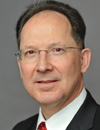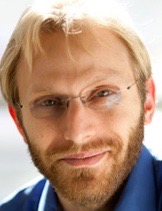Tuesday, 17 March 201508:00 | Registration | |
Centrifugal Microfluidics |
| | |
Session Chair: Daniel Filippini, Linkoping University |
| | 09:00 | Comprehensive Integration, Automation and Parallelisation of Multi-step Bioanalytical Assay Formats on the Centrifugal Microfluidic Lab-on-a-Disc Platform
Jens Ducree, Principal Investigator, Dublin City University, Ireland
Novel, event- and pulse-triggered valving concepts functioning by digital logical elements akin to microelectronics are added to the repertoire centrifugal microfluidic systems. These spatio-temporal flow control schemes orchestrate sample-to-answer automation and parallelisation for comprehensive integration of various bioanalytical test formats such as molecular diagnostics, immunoassays and cell counting on these “Lab-on-a-Disc” platforms.
| 09:45 |  Technology Spotlight: Technology Spotlight:
All in One: Advanced Technologies for Complex Low Cost Microfluidic Devices
Alexander Schilling, CEO, Little Things Factory
The presentation shows that advanced process methods leads to low cost microfluidic devices made from glass, quartz and silicon. These materials are playing an important role as substrate materials for microfluidic devices.
| 10:00 | Coffee and Networking in Exhibition Hall | |
Integration |
| | 10:45 | Microfluidic Large-scale Integration Applied to Systems and Synthetic Biology
Sebastian Maerkl, Assistant Professor, Ecole Polytechnique Federale de Lausanne, Switzerland
My laboratory is primarily concerned with solving pertinent problems in biology through the application of microfluidic large-scale integration. We have developed numerous novel microfluidic approaches for diverse applications in systems biology, synthetic biology, and diagnostics. In this talk I will give a broad overview of our activities and describe several examples of how microfluidic technology can enable biological investigations through high-throughput quantitative analysis of systems in vitro and in vivo. | 11:30 | Magnetic Particle Actuation and Stationary Microfluidics for Integrated Lab-on-Chip Biosensing
Menno Prins, Professor, Eindhoven University of Technology & Helia BioMonitoring, Netherlands
In this presentation, I will review the use of magnetic particles actuated by magnetic fields to realize integrated lab-on-chip diagnostic devices wherein several assay process steps are combined, e.g. to mix fluids, capture analytes, concentrate analytes, transfer analytes, label analytes, and perform stringency and washing steps. I will focus on realizations within the concept of stationary microfluidics, in which fluid manipulation is minimized and the assay steps are essentially effectuated by magnetic particles and magnetic forces. I will discuss efforts to combine and integrate different magnetically actuated assay steps, with the vision that it will become possible in the future to realize integrated, cost-effective and easy to use stationary-fluidic biosensing systems in which all assay process steps are controlled and optimized by magnetic forces.
| 12:15 |  Technology Spotlight: Technology Spotlight:
Process Perfection for LoaC Mass Production
Leonhard Schwab, CTO, Dr Schwab Inspection Technology GmbH
For cost effective mass production of LoaC automated process control is inevitable. A monitoring system for process optimization is presented that combines high resolution vision inspection for dimensional analysis and defect detection with physical measurement and process statistics.
| 12:30 | Lunch & Networking in Exhibition Hall | |
13:30 Poster Viewing | Session Sponsors |
| | |
Session Chair: Menno Prins, Eindhoven University |
| | 14:15 | Getting Microfluidics to Work as a Product – Intricacies from Cost to Function
Ralf Himmelreich, Head of Biodiagnostics Group, Fraunhofer ICT-IMM , Germany
The talk will cover aspects of systems engineering and show examples of solutions with proven functionality in regards to production-related issues. The aim is to give an overview about the intricacies in systems engineering if a LabChip system is transferred to product development.
| 15:00 | Unibody Lab-on-a-Chip Fast Prototyping
Daniel Filippini, Professor, Linkoping University, Sweden
The development of disposable devices for optical chemical detection with cell phones, entail challenging demands to configure autonomous systems. A flexible, fast and cost-effective fabrication concept is investigated to meet such demands.
Unibody lab-on-a-chip (ULOC) devices are conceived around a single 3D printed monolithic structure that hosts all the complementary functionalities for sample handling, chemical interfacing and detection coupling. Prototypes can be produced in less than 30min for about 0.5 US$/device, and in this presentation their capabilities and potential are examined.
| 15:45 | Coffee and Networking in Exhibition Hall | |
Market Orientated Device Development |
| | 16:30 | Hype, Hope and Hubris: The Quest for a Killer Application in Microfluidics
Holger Becker, Chief Scientific Officer, Microfluidic ChipShop GmbH, Germany
Almost 25 years after the introduction of the concept of the "miniaturized total chemical analysis system (µTAS)" and about 15 years after the gold digger`s frenzy about how this technology would revolutionize all aspects of chemical, biological or diagnostic protocols, it is worth to have a look how this technology has matured (or at what places it might have made a wrong turn). Currently, a significant part of the early day's promises are being fulfilled and the number of commercial applications and products is rapidly growing. A review on roadblocks as well as success factors for the commercialization of microfluidic devices will be given as well as an overview on commercially available manufacturing routes with their specific application to microfluidics. Various examples for developments of microfluidic applications and their manufacturing technologies will be presented. | 17:15 | Microfluidics Market Outlook: What are the Next Sweet Spot Applications?
Benjamin Roussel, Business Unit Manager of the Microfluidic & Medical Technologies (MedTech), Yole Développement, France
| 18:00 | Drinks Reception |
Wednesday, 18 March 2015 |
Biological Analysis |
| | |
Session Chair: Dino Di Carlo, UCLA |
| | 09:00 |  | Keynote Presentation Microfluidic Tools for Research on Cells
Roland Zengerle, Professor, University of Freiburg, Germany
Two novel microfluidic tools for high throughput single cell assays are presented: i) a single cell dispenser for isolation and dispensing of individual cells and ii) an integrated chip for analysis of fast protein phosphorylation kinetics in single cells to study signaling pathways.
|
| 10:00 | Coffee and Networking in Exhibition Hall | 10:45 | Organ Models on Chip: Unveiling and Mimiking Physiology
Antoni Homs i Corbera, Senior Researcher, Institute for Bioengineering of Catalonia, Spain
| 11:30 | Microfluidic Platforms for the Exploration of Living Organisms and their Interactions
Claire Stanley, Postdoctoral Research Associate, ETH Zurich, Switzerland
I will provide an overview of my current research activities, specifically the development of novel microfluidic platforms for (i) studying the interplay between filamentous fungi and microorganisms at the single cell level and (ii) applying combinations of stimuli to plant roots using optical microscopy. | 12:15 |  Technology Spotlight: Technology Spotlight:
Recent Developments in Droplet Based Microfluidic Technologies
Ashok Sinha, Technical Applications Specialist, Dolomite Microfluidics
This article reports on the microfluidics market, identifies technological bottlenecks, and showcases a few successful and fast growing applications. Amongst these are cell encapsulation, droplet generation, high-throughput droplets & particles, double emulsions, nanoparticle synthesis, and droplets on demand.
| 12:30 | Lunch & Networking in Exhibition Hall | |
13:30 Poster Viewing | Session Sponsors |
| | |
Session Chair: Antoni Homs i Corbera, Institute of Catalonia |
| | 14:00 |  | Keynote Presentation High-throughput Physical Phenotyping of Cells for Biomedicine
Dino Di Carlo, Armond and Elena Hairapetian Chair in Engineering and Medicine, Professor and Vice Chair of Bioengineering, University of California-Los Angeles, United States of America
Physical properties of cells can provide integrative, rapid, and low-cost information about disease. I will discuss a range of microtechnologies that assay the physical properties of cells in a high-throughput and quantitative manner for applications in diagnostics and drug screening. |
| |
Developments in Label Free Detection |
| | 15:00 | On-a-Chip LSPR Sensing for Cancer Marker Screening in Serum and Chiral Discrimination of Enantiomers
Romain Quidant, Professor, Institute of Photonic Sciences, Spain
We discuss the use of plasmonic nanoantennas combined with advanced microfluidics for the label-free detection of biomolecules. Our LSPR platform is successfully applied to the parallel detection of protein cancer markers in serum and the chiral discrimination of enantiomers.
| 15:45 | Coffee and Networking in Exhibition Hall | 16:00 | Microwave-to-Terahertz Sensing in Microfluidic Systems
Norbert Klein, Professor, Imperial College London, United Kingdom
Microwave-to-terahertz detection of biological liquids and cells provides a new window for label free cell analysis within a lab-on-chip high-throughput approach. First results on accurate haemoglobin measurements and integrated structures for the THz range will be discussed. | 16:45 | Close of Conference |
|
